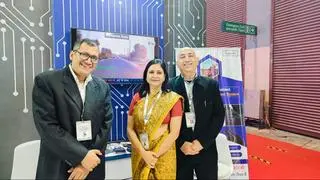‘It has been quite a journey for this 28-year-old computer engineering graduate from West Bengal University. Hailing from a community that has business in its genes, Ankit Poddar was sure he was not going to work for somebody else. That is why, he says, he never appeared for any interview on campus.
The first year in college, he recalls, was boring. From the second year, things started to change. He was keen to build products and participated in a number of competitions and won prizes.
Initial ideaAnkit’s initial idea was to build turbines to generate electricity from running water. That is when he approached Ashok Jhunjhunwala, a faculty member at IIT-Madras and a mentor to many a student aspiring to be an entrepreneur. A visit to IIT-Madras, while he was still in university, convinced Ankit to shift base to Chennai to pursue his dreams as an entrepreneur. In Chennai, after completing his engineering course, Ankit realised that his idea to build micro water turbines was not taking off as expected. Jhunjhunwala suggested that he find out ways to reduce electricity consumption at the incubator in IIT-Madras, where Ankit was located. That is how Ankit switched tracks and founded a venture that has developed energy efficient air-conditioning systems.
“We started work on this air-conditioning project in September 2013,” says Ankit. The whole building is centrally air-conditioned and there is a lot of inefficiency in the way it works. For instance, he says, the cooling is not uniform and the blower works even in areas where there are no occupants. Ankit and his team spent time finding out how to make the cooling uniform, ensure that it happened only where there were occupants and bring down electricity consumption. “We have redesigned the system in such a way that there is proper air distribution and balancing. We can cut out the AC supply from the sections where there are no occupants,” says Ankit.
Incorporated in January 2015, Swadha Energies has designed and developed the mechanical systems and electronics that help cut electricity consumption in the AC systems, using advanced power electronics integrated with the building management system.
According to Ankit, they have been able to achieve a 30 per cent saving in the electricity bill in the 3,500 sq ft space in the research park where it tried out the project. “Every day it was consuming 34 units of electricity. In August, we installed the variable frequency drives and sensors and after that consumption dropped to 12-13 units a day,” says Ankit.
Two waysThere are two parts, he says, where electricity is consumed in an air-conditioning system. One is in air distribution and the other is the chiller unit. Swadha has been able to cut down on electricity consumption in both.
It has bid for and won the contract for installing the complete air-conditioning in the second phase of the research park, for which it will source the air-conditioning unit and integrated the energy saving sensors, VFDs and also introduced something called thermal storage, where during night, when the demand for air-conditioning drops, it will chill the water and keep it chilled and use it during the day when demand for cooling increases. This has called for changes in the storage tank.
Last financial year, Swadha earned an income of ₹1-1.5 crore and hopes to hit ₹3-3.5 crore this year. It needs to get its products certified before it can bid for similar projects outside.








Comments
Comments have to be in English, and in full sentences. They cannot be abusive or personal. Please abide by our community guidelines for posting your comments.
We have migrated to a new commenting platform. If you are already a registered user of TheHindu Businessline and logged in, you may continue to engage with our articles. If you do not have an account please register and login to post comments. Users can access their older comments by logging into their accounts on Vuukle.